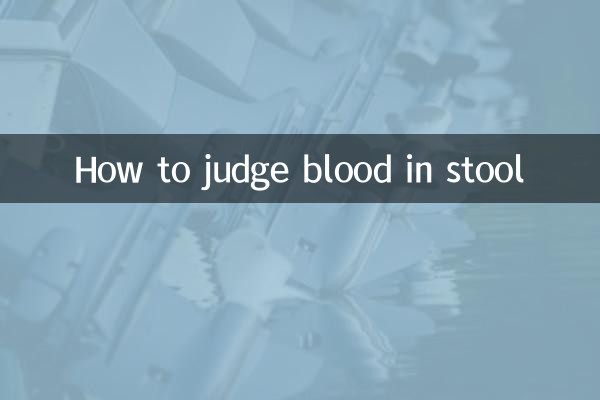How to judge blood in stool
Blood in the stool is a common symptom that can be caused by a variety of causes, including hemorrhoids, intestinal infections, intestinal polyps, and even colon cancer. Correctly determining the cause of hematochezia is crucial for timely treatment. This article will combine the hot topics and hot content on the Internet in the past 10 days to provide you with a detailed analysis of how to judge blood in the stool.
1. Common causes of bloody stools

There are many causes of blood in the stool. Here are some common causes:
| Cause | Symptoms | High-risk groups |
|---|---|---|
| Hemorrhoids | Bright red blood, often attached to the surface of feces or bleeding after defecation | Sedentary, constipation, pregnant women |
| anal fissure | Severe pain during bowel movements and small amounts of bright red blood | Constipation patients |
| intestinal polyps | Painless bloody stools with darker blood color | Middle-aged and elderly people |
| colon cancer | Dark red or black blood, possibly accompanied by weight loss | People over 50 years old |
| intestinal infection | Bloody stools accompanied by diarrhea and abdominal pain | all ages |
2. How to judge the severity of blood in the stool
To judge whether the blood in the stool is serious, you can observe from the following aspects:
| Observation indicators | Mild | Moderate | Severe |
|---|---|---|---|
| amount of bleeding | A small amount, visible only on paper towels | Visible blood visible in the urinal | Heavy bleeding, even leading to anemia |
| color | bright red | dark red | Black (tarlike) |
| accompanying symptoms | No or slight discomfort | Abdominal pain, bloating | weight loss, fatigue |
| duration | Short term, 1-2 days | lasts for several days | Lasts more than 1 week |
3. Medical advice for blood in the stool
According to the different manifestations of blood in the stool, the following are some medical suggestions:
| Situation description | Suggestions |
|---|---|
| Blood in stool for the first time | It is recommended to seek medical treatment as soon as possible to determine the cause of the disease |
| Blood in the stool accompanied by severe abdominal pain | Immediate emergency treatment, possible intestinal obstruction or intestinal perforation |
| Blood in the stool lasts for more than 3 days | Further examination by a specialist is required |
| Blood in the stool accompanied by weight loss | Be highly vigilant about the possibility of tumors and need to be checked as soon as possible |
| Blood in the stool in the elderly | Colonoscopy is recommended to rule out tumors |
4. Preventive measures for blood in the stool
To prevent blood in the stool, you can start from the following aspects:
1.Diet modification:Increase dietary fiber intake, drink more water, and reduce spicy and irritating foods.
2.Living habits:Avoid sitting for long periods of time, exercise moderately, and develop good bowel habits.
3.Regular physical examination:Especially for people over 40 years old, it is recommended to undergo regular colonoscopy.
4.Timely treatment:Problems such as hemorrhoids and anal fissures should be treated promptly to avoid aggravation.
5. Health topics hotly discussed across the Internet
In the past 10 days, discussions about blood in the stool have mainly focused on the following aspects:
| topic | heat index | Main point |
|---|---|---|
| Self-diagnosis of hemorrhoids | 85% | How to distinguish hemorrhoids and other causes of blood in the stool |
| Gut Health Screening | 78% | The importance of colonoscopy and the experience of painless colonoscopy |
| Home treatments for bloody stools | 65% | Which situations can be observed at home and which require immediate medical treatment? |
| Diet therapy improves blood in the stool | 60% | Which foods can help relieve symptoms of blood in the stool |
Conclusion
Although blood in the stool is common, it should not be taken lightly. By observing the color, amount, duration and other characteristics of bleeding, the cause can be preliminarily determined. For persistent or worsening blood in the stool, seek medical attention promptly. The key to preventing hematochezia lies in a healthy lifestyle and regular physical examinations. I hope this article helps you better understand and deal with the problem of bloody stools.

check the details

check the details